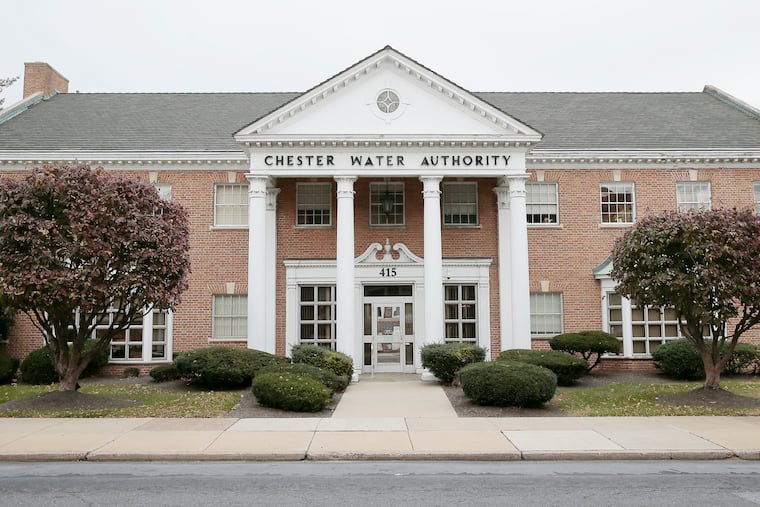Despite budget deficits and bankruptcy, Chester should not sell off its water system | Editorial
Recent sales in other communities have led to massive increases in consumer utility bills. More than 200,000 people across 37 municipalities in Delaware and Chester Counties would be affected.

The City of Chester’s bankruptcy filing last month was decades in the making. Difficult choices will determine if and when Chester bounces back.
But this much is clear: A healthy Chester is in the interest of everyone from Delaware County to Philadelphia to Harrisburg.
Chester, the oldest city in Pennsylvania, enjoyed an economic boom after both World Wars, thanks to a thriving shipyard and growth in manufacturing. The city’s population peaked at 66,000 in the 1950s but has since dropped by half.
Chester’s steady decline is a microcosm of many cities and towns in Pennsylvania and across the country. Civil unrest, white flight, and a decline in manufacturing jobs over the last half-century left Chester on the brink. Major employers moved, were sold, or closed, including Scott Paper Co. (which at one time produced 60% of the world’s toilet paper), the railroad manufacturer Baldwin Locomotive, and Sun Shipbuilding and Dry Dock Co.
Chester’s decline was compounded by poor policy choices over the years.
In 1992, the city allowed the construction of a large trash incinerator that is an ugly blight and one of the largest polluters of its kind in the country. The mostly Black residents who live in Chester have rightly pointed to the incinerator as an example of environmental racism and cite the numerous pollution-related health ailments among Chesterites, including asthma and elevated concentrations of lead in children’s blood.
» READ MORE: Chester City has filed for bankruptcy and asked for federal mediation to resolve its debts
In 2006, then-Gov. Ed Rendell touted a casino in Chester as a way to create jobs and spur economic development. The casino contributes millions to Chester’s coffers, but most of the employees do not live in the city and there has been very little development.
That should not be a surprise. Casinos are not economic engines. Just ask Atlantic City. Studies show casinos strip wealth from area residents and increase social costs, including more bankruptcies, divorces, and suicides.
In 2008, Rendell was back with a plan to build a soccer stadium for the Philadelphia Union he said would “change the face of Chester forever.” But sports stadiums do not promote economic growth. While thousands of fans come to Chester for home games, there are only a handful of games a year, and the stadium mostly sits empty. Despite $87 million in taxpayer subsidies for the new stadium, the $500 million in development touted by Rendell never materialized.
Chester’s final straw came earlier this year when the city lost $400,000 in a phishing scam. To borrow from Hemingway: How did Chester go bankrupt? Two ways. Gradually, then suddenly.
The good news is Chester has assets to build around. The Crozer-Chester Medical Center and Widener University are institutional anchors. Other cities, including Philadelphia, have been economically powered by so-called eds and meds.
A recent plan titled “Reimagining Chester” details the city’s strengths and weaknesses and offers a comprehensive road map forward.
One strength Philly should learn from: Chester has reduced its gun violence by 60%. The city has a waterfront that could be developed as well as excellent access to highways, the airport, and rail.
» READ MORE: It’s time to repeal the Pa. law that allows the sale of municipal water systems | Editorial
One of Chester’s most valuable assets is its water department. Private water companies have been snapping up public water and sewer utilities thanks to a misguided 2016 state law that opened the door for the sale to for-profit companies.
Chester City Council voted last year to sell the Chester Water Authority to Aqua Pennsylvania for $410 million, but the sale has been tangled up in litigation.
Despite Chester’s pressing financial troubles, selling the water utility would be a giant mistake. Recent sales in other towns have led to massive increases in consumer water bills of 50% or more.
With a poverty rate of 36%, many Chester residents would struggle to pay higher water bills. They are not alone: The sale of the Chester Water Authority would impact 200,000 people across 37 municipalities in Delaware and Chester Counties. This is just one example of how Chester’s financial troubles can directly affect the region.
Chester faces a $46.5 million deficit, which is almost as much as its $55 million budget. Tough choices about public employee pensions and other costs await. Leadership, innovation, and help from the county, region, and state are needed.
Other cities — big and small — have gone through bankruptcy and emerged stronger.
In 2013, Detroit became the largest city in America to file for bankruptcy. Just two years later, National Geographic called Detroit “cool again.” Detroit still faces challenges, but the Motor City’s recovery shows there is a path to prosperity.
But Chester’s revival should not begin with the fire sale of its water authority.
Chester should build on its assets, and not sell them off.